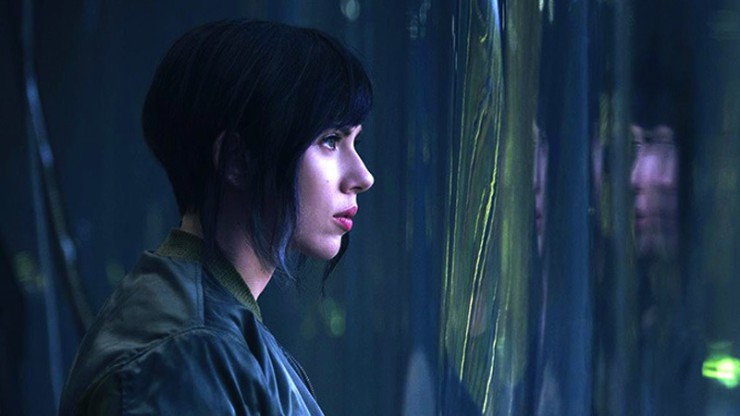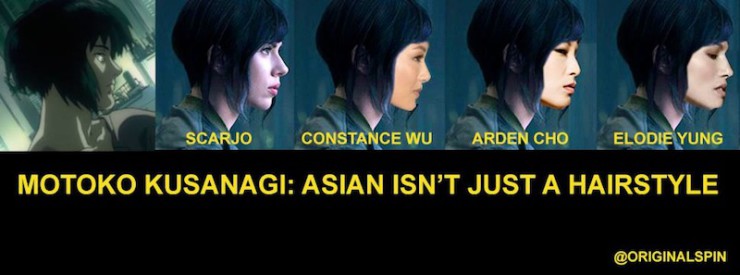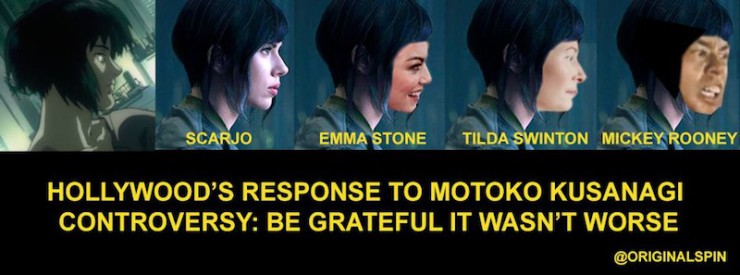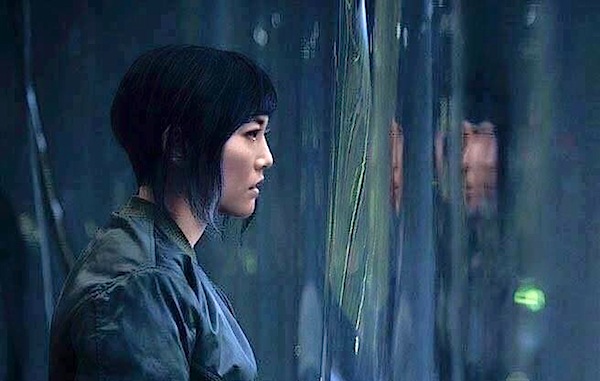Well, we may have done it. We may have hit peak whitewashing last week. Between Calvin Trillin’s well-intentioned but tone deaf New Yorker poem, Tilda Swinton making her first appearance as The Ancient One in the Doctor Strange trailer, and the first image of Scarlett Johansson as Major Kusanagi in Ghost in the Shell (above), this past week seemed to drive home the idea that Asian culture is packaged as “other” and that Asian characters can be turned white on a whim.
Over the last week, there have been several responses from the internet. I’ve rounded up a few of my favorite reactions, but more importantly, I want to look at the larger question: why is Hollywood still whitewashing Asian characters?
Jeff Yang posted this example of other actresses who could have easily stepped into Kusanagi’s shoes:
In contrast, he also posted the reverse of the image, highlighting a history of whitewashed Asian characters:
And Sue Pak shared my own favorite dream casting: Rinko Kikuchi as Kusanagi.
Kotaku rounded up some Japanese GITS fans’ reactions several of whom also mention picturing Kikuchi in the lead role. (Two of my favorite snarkier responses: “Twenty years ago this would’ve been Milla Jovovich” and “Taylor Swift would’ve been better”.) Sam Yoshiba, director of the international business division at Kodansha, the publishing company that released GITS back in 1989, seems fine with the casting decision – but he also says, “…we never imagined it would be a Japanese actress in the first place” which is the place where I ask, “Why not?”
Before you say, “well, obviously Scarlett Johansson was cast because money” I’ll cede that point—Johansson is a bankable actress, having successfully starred in sci-fi films like Her, Under the Skin, and Lucy, and who has a potentially giant fanbase to bring to Ghost in the Shell’s opening weekend. But why was this casting decision made in the first place when it was clear there would be so much controversy? Obviously you can also argue that this is anime, it’s sci-fi, it’s the future, once you’re dealing with cyborgs anyone can be anything, etc. But why is saying all of that easier than just hiring a Japanese actress for a distinctly Japanese role? GITS is a twenty-year-old manga written by Masamune Shirow, a Japanese writer and illustrator, which wrestled with issues unique to Japanese culture in the 1990s. It was adapted into an anime by Mamoru Oshii, featuring Japanese voice actors, and only came to the U.S. on video in the year after its Japanese release.
Besides the fan reactions, there have been a few responses to the casting from within the industry. Several people began recirculating an older interview with Agents of S.H.I.E.L.D. star Chloe Bennett, in which she spoke about how changing her name from “Wang” to “Bennet” made a giant difference to her career. And in direct response to the Ghost in the Shell image, Bennet’s co-star Ming-Na Wen simply posted:
Nothing against Scarlett Johansson. In fact, I'm a big fan. But everything against this Whitewashing of Asian role.😒 https://t.co/VS6r6iish9
— Ming-Na Wen (@MingNa) April 14, 2016
And this is just the latest in a long history of Hollywood’s whitewashing minority characters. In just the past few years we’ve seen Keanu Reeves initially cast as a Japanese character in the since-scuttled live-action Akira; horrible, horrible things done to Avatar: The Last Airbender; Benedict Cumberbatch cast as KHAAAAAN; the Irish-American Rooney Mara cast as Native American Tiger Lily in Pan; Noah and Exodus both continued the tradition of casting white (mainly British) actors as ancient Hebrews and Egyptians, and Gods of Egypt… well, we didn’t even want to talk about Gods of Egypt, which is why I didn’t bother to review it; and maybe weirdly absolutely worst of all, Emma Stone cast as “Allison Ng” in Cameron Crowe’s Aloha, a character who was supposed to be ¼ Hawaiian and ½ Chinese. (Crowe responded to the controversy around the casting by saying that the real-life Allison Ng looked white, and was conflicted about that—which is fine, but for the love of Lloyd Dobler, saying “but it really happened like this!” is the sort of argument that will get you thrown out of a first-year fiction workshop.) And again, it’s not so much that any of the actors caught up in these casting decisions are bad actors—but there are plenty of great Asian and Asian-American actors, too, and if Hollywood gave them more chances, and courted an audience that’s hungry for authentic storytelling, I think the box office results would pay off.
The one place where whitewashing maybe, arguably, possibly worked, was in the Wachowski’s 2012 film Cloud Atlas—but the whole reason the practice worked there was that everyone was cast in multiple roles across racial and gender lines. Given that the point of the David Mitchell’s novel is (if you haven’t read it yet, spoilers ahead): several characters are reincarnated across time and space in order to learn about love and maybe, arguably, possibly save the human race, and that the point of the movie is (again, spoilers!): everything I just said, plus REVOLUTION!, the racial chicanery in that film actually served a purpose. It told its own subtextual story.
I can also see the pitfalls with adapting Doctor Strange—if you cast an elderly Asian man as The Ancient One (as he is portrayed in the original Marvel comics), then you’ve fallen into the trope of Asian culture passed on to the one special white person who understands it, and thus another generation of earnest snowy white middle class undergraduate Tibetan Buddhists is born. Of course, they could have overcome that problem by hiring—gasp!—two Asian leads. But apparently we only change character’s races to give more white actors roles, because then if we look at Netflix’s upcoming Iron Fist, where they could have so effectively swapped a white character for one of Asian descent, Marvel chose not to. Sure, Danny Rand is white in the comics, but Marvel had an opportunity to do something really cool here—how amazing would it have been to cast an Asian-American actor, and update the character so that part of Rand’s superheroic learning arc includes understanding his family’s culture and roots? So many people, of all races, would relate to that. How powerful would that have been, too, as a corrective to the endless, troubling ninja deaths on Daredevil, and the Orientalizing tendencies the writers have shown toward Nobu and Madame Gao? Speaking as a New Yorker, I would have loved a Defenders line-up that represented the diversity of my city.
Of course the bigger concern is who is really at fault here? At what point do actors, writers, directors, and producers have a responsibility to say no to projects that are trampling their source material and whitewashing characters? Should it be on them to walk into a casting director’s office with a list of actors who are right for the part? Is it on the casting directors to make sure notices get to a wider range of talent? Or is it just our responsibility as viewers to stop going to these movies?
When we look back at something like Mickey Rooney’s performance as I.Y. Yunioshi in Breakfast at Tiffany‘s, which used a white actor performing a demeaning racial stereotype in a insultingly misguided attempt at comedy, most people will immediately recognize that it is wrong and upsetting on every level. (Jeff Yang actually wrote a piece about the character, saying, “I think it should be mandatory viewing for anyone who wants to fully understand who we are as a culture, how far we’ve come and how far we still need to go.”) Movies like Doctor Strange and Ghost in the Shell presumably aren’t setting out to insult or mock Asian characters, or to demean Asian actors or audience members. But the truth is, the decision to cast a white person has consequences: in terms of representation, it robs viewers (of all races) of the chance to see greater diversity onscreen, privileging/shoring up the white default yet again. It helps to limit opportunities for actors of color across the board, by implicitly enforcing that default, and the idea that white actors are somehow more valuable or more desirable within the industry. It implies that white faces are somehow more relatable, more worthy of “our” interest—without taking notice of the fact that “we” are not a white monolith, and never were. “We” are the entire audience, the geek community, the casual fan, the dad who just wants to take his kid to a fun movie on Saturday afternoon, and “we” can be anyone. To repeatedly state that white characters are the heroes, the Chosen Ones, while every other race is left to be the sidekick or the wise elder passing down knowledge is simply wrong. It has always been wrong. No Hollywood studio would get away with a horrific caricature like Yunioshi these days, it’s true. But quiet and systemic racism, in many ways, is so much worse than overt racism—Mickey Rooney bellowing through buck teeth is easy to dismiss, but people still feel the need to defend and excuse whitewashing, and so it continues.
Leah Schnelbach is frustrated that we’re still having this conversation. Come, join her in frustration on Twitter.













